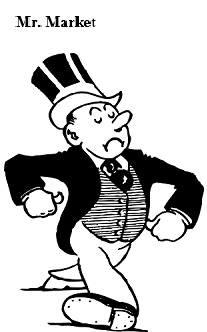by Shai Angel
Throughout the history of investment in the stock market, we hear or read from analysts, economic reporters, highly appreciated investors, and more regarding the stock market situation and forecast. The benchmark for economic strength is often based on where the market is. History shows that when economic crises occur, such as COVID-19 and Sub Prime, the market responds accordingly, sometimes more aggressively than expected. Why is it so crucial to be familiar with Mr. Market? simply because most private and public money is invested in this market.
Benjamin Graham, the well-known economist, father, and founder of value investing, initially presented the idea of “Mr. Market” in his 1949 book “The Intelligent Investor.” Graham uses a made-up character named Mr. Market to explain and emphasize how the stock market behaves and the opportunities it offers investors. Mr. Market has several characteristics any investor should be familiar with:
Will you offer us a hand? Every gift, regardless of size, fuels our future.
Your critical contribution enables us to maintain our independence from shareholders or wealthy owners, allowing us to keep up reporting without bias. It means we can continue to make Jewish Business News available to everyone.
You can support us for as little as $1 via PayPal at office@jewishbusinessnews.com.
Thank you.
- Emotional and irrational
Mr. Market is portrayed as extremely sentimental, illogical, and erratic. His actions can be impacted by things like fear, greed, and breaking news.
- Daily stock Price Quotations
Graham uses the metaphor of Mr. Market as if Mr. Market was daily knocking on an investor’s door offering to purchase or sell shares at various prices. Mr. Market’s prices could differ significantly each day and each moment, depending on how he was feeling at the moment.
- Opportunity for investors
Graham advises investors to approach Mr. Market with a logical and disciplined perspective rather than responding to his daily quotations with the same emotional fervor of greed, fear and irrationality. Investors might profit from the erratic behavior of Mr. Market most of the time by purchasing cheap and selling high.
- Intrinsic value vs Market price
Graham highlights the difference between market pricing and intrinsic value. Market price is the price at which an investment is currently trading in the market. on the other hand, intrinsic value is the actual value of an investment based on its fundamentals. The quotes from Mr. Market, most of the time, depart from fundamental value, therefore giving investors buy or sell opportunities of an investment.
- Long term Perspective
Graham advises against letting the short-term market swings influence investors’ long-term investment strategy and instead concentrates on the long-term underlying worth of their holdings.
A potent metaphor for the volatile and emotional character of the stock market is Mr. Market. A key component of value investing is recognizing and taking advantage of Mr. Market’s mood swings, highlighting the significance of discipline, patience, rationality, and a long-term view when making financial decisions. Our investment returns would be higher as long as we could take advantage of Mr. Market.
 Shai Angel, CPA, earned a master’s degree in law, a bachelor’s degree in accounting and economics, and a certificate in director training. He has previously held senior financial positions in well-known businesses. In his years of working in the financial industry, he has actively learned about “Value Investing” from some of the most prominent investors in the world, including Warren Buffett, Peter Lynch, Mohnish Fabray, and others, and also applied their investment strategies. (Shai Angel Linkedin)
Shai Angel, CPA, earned a master’s degree in law, a bachelor’s degree in accounting and economics, and a certificate in director training. He has previously held senior financial positions in well-known businesses. In his years of working in the financial industry, he has actively learned about “Value Investing” from some of the most prominent investors in the world, including Warren Buffett, Peter Lynch, Mohnish Fabray, and others, and also applied their investment strategies. (Shai Angel Linkedin)




